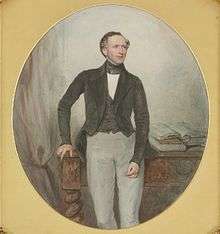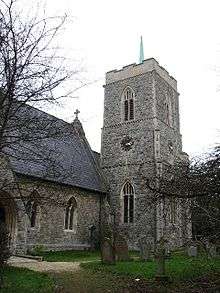Christopher William Puller
Christopher William Puller (1807–1864), from 1857 Christopher William Giles Puller, was an English barrister and politician.[1][2]

Life
The son of Sir Christopher Puller and his wife Louise King, he was educated at Eton College and Christ Church, Oxford. A college friend of W. E. Gladstone, he graduated B.A. in 1828, and M.A. in 1832. He was called to the bar at Lincoln's Inn in 1832, and went into practice as a chancery barrister. He resided at Youngsbury.[1][3]
At the 1857 general election, Puller became Member of Parliament for Hertfordshire; and he was re-elected in 1859.[1][4] He was a Liberal who took an interest in the church rate debates of 1858 to 1861.[5] He was also regarded as an expert on the education issue.[6]
Giles Puller was in 1858 a secretary of the India Missions Extension of the Society for the Propagation of the Gospel; he had been on the Standing Committee of the Society from 1850.[7][8] He died on 16 February 1864 at Youngsbury.[9] His replacement as Member of Parliament was Henry Surtees.[10]
Legacy
A memorial window was created in St Mary's Church, Standon, Hertfordshire.[11] The High Cross Puller Memorial primary school was built by the family to his memory.[12]
Family

Puller married Emily Blake, daughter of William Blake, on 2 July 1831. They had five sons and four daughters.[15][16] Their children included:
- Arthur Giles (born 1833), the eldest son.[17]
- Charles (born 1834), the second son, who was a Fellow of Trinity College, Cambridge, and vicar of Standon, Hertfordshire.[18]
- Christopher Cholmeley (1839–1902), Treasury clerk.[19]
- Frederick William (1842–1938), fourth son, a clergyman who joined the Society of St John the Evangelist.[20][21]
- Mary Caroline, who married John Garnier (1838–1929), son of Thomas Garnier.[22]
- Alice Henrietta, the youngest daughter, married in 1882 Claude Cecil Thornton as his second wife; he was vicar of High Cross, Hertfordshire from 1881 to 1892.[23]
Notes
- E. Walford. The county families of the United Kingdom. Рипол Классик. p. 251. ISBN 978-5-87194-361-8.
- "Puller, Christopher William Giles- (1807–1864), politician and barrister, The National Archives". Retrieved 24 December 2015.
- William Ewart Gladstone (15 February 1969). The Gladstone Diaries: 1825–1832 : 1833–1839. Oxford University Press. p. 194. ISBN 978-0-19-821370-3.
- "The Present Peerage of the United Kingdom". Internet Archive. Piccadilly, London: James Ridgway. 1864. p. 39. Retrieved 24 December 2015.
- J. P. Ellens (January 2008). Religious Routes to Gladstonian Liberalism: The Church Rate Conflict in England and Wales 1852–1868. Pennsylvania State University Press. pp. 189–90 note 88. ISBN 978-0-271-02843-9.
- The British Controversialist: And Literary Magazine. Houlston and Sons. 1862. p. 367.
- The Saturday Review of Politics, Literature, Science, Art, and Finance. Saturday Review, Limited. 1858. p. 200.
- Mission Field: A Monthly Record of the Proceedings of the Society for the Propagation of the Gospel in Foreign Parts. 1864. p. 58.
- Sylvanus Urban (pseud. van Edward Cave.) (1864). Gentleman's Magazine, and Historical Chronicle. Edward Cave. p. 536.
- The Gentleman's Magazine. F. Jefferies. 1864. p. 515.
- The Builder. 1865. p. 67.
- "High Cross Puller Memorial C of E Primary School – 1102368, Historic England". Retrieved 24 December 2015.
- 'Parishes: Standon', in A History of the County of Hertford: Volume 3, ed. William Page (London, 1912), pp. 347–366 http://www.british-history.ac.uk/vch/herts/vol3/pp347-366 [accessed 18 December 2015].
- Jill Allibone (1987). Anthony Salvin: Pioneer of Gothic Revival Architecture, 1799–1881. University of Missouri Press. pp. 171–. ISBN 978-0-8262-0629-9.
- Sir Bernard Burke (1863). A Genealogical and Heraldic Dictionary of the Landed Gentry of Great Britain and Ireland. Harrison. p. 1235.
- The Asiatic Journal and Monthly Register for British and Foreign India, China and Australasia. Allen. 1831. pp. 1–.
- Edward Walford (1869). The County Families of the United Kingdom Or, Royal Manual of the Titled and Untitled Aristocracy of Great Britain and Ireland ... R. Hardwicke. p. 803.
- Sir Bernard Burke (1871). A Genealogical and Heraldic History of the Landed Gentry of Great Britain & Ireland. Harrison. p. 113.
- "Register, 1847–1962 – 9, Radley College Archives". Retrieved 24 December 2015.
- David Bertie (2000). Scottish Episcopal Clergy, 1689–2000. Bloomsbury Academic. pp. 406–7. ISBN 978-0-567-08746-1.
- College of S. Augustine Canterbury: Participants at the Consecretation, S. Peter's Day 1848 (PDF) at p. 42
- Richard J. Bleiler (1 June 2015). The Strange Case of "The Angels of Mons": Arthur Machen's World War I Story, the Insistent Believers, and His Refutations. McFarland. p. 128. ISBN 978-1-4766-2096-1.
- "Thornton, Claude Cecil (THNN862CC)". A Cambridge Alumni Database. University of Cambridge.